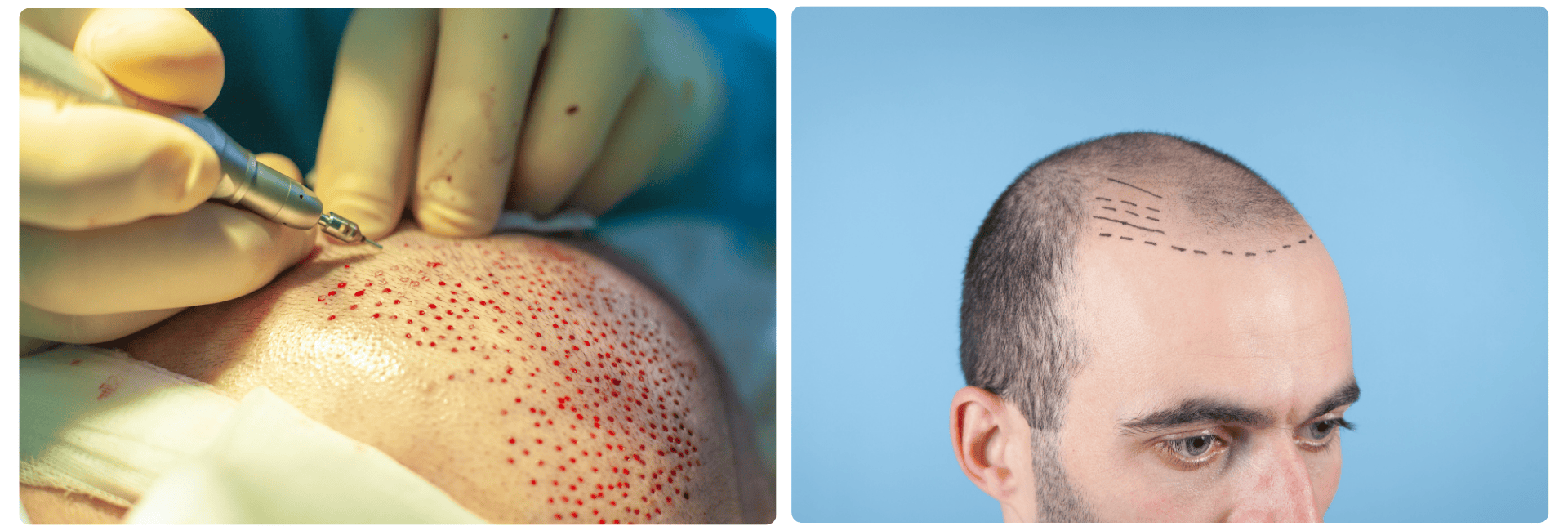
5 Benefits of hair transplantation
Hair loss can significantly impact someone's self-confidence and overall quality of life. Fortunately, modern medical science offers an effective solution in the form of hair transplantation. This procedure carries significant benefits that extend far beyond mere aesthetics. Here are five key advantages of a hair transplant.
5 Benefits
1. Restoration of self-confidence
One of the most tangible benefits of a hair transplant is the restoration of self-confidence. Hair loss can be a source of embarrassment and discomfort for many. By addressing baldness or thinning hair, a hair transplant can help a person feel more self-assured and present themselves better in both personal and professional settings.
2. Permanent solution for hair loss
Unlike many other remedies, a hair transplant offers a permanent solution for hair loss. This means that the transplanted hairs are permanent, providing patients with long-term and often lifelong improvement in hair growth.
3. Natural and unobtrusive results
Modern hair transplantation techniques yield highly natural results. With methods like Follicular Unit Transplantation (FUT) and Follicular Unit Extraction (FUE), hair follicles can be precisely placed to simulate natural hair growth. The transplanted hair will grow and behave like natural hair, making the results look unobtrusive and authentic.
4. Minimal maintenance requirements
After a hair transplant, little to no additional maintenance is required for the transplanted hair. It should be treated and cared for like natural hair: regular washing, trimming, and styling according to personal preferences.
5. Safe and proven method
Hair transplantation is a proven and safe procedure with relatively few risks and a high success rate. Utilizing advanced techniques and experienced surgeons, this procedure offers a reliable way to address hair loss.

Informed decision
Undergoing a hair transplant is a personal choice that brings significant benefits. It not only restores lost hair but also the self-confidence and joy of life for people dealing with hair loss. For those considering a hair transplant, it is advisable to consult a qualified specialist and carefully consider the options.
Remember that any medical intervention carries risks. Always consult a knowledgeable physician for sound advice and to make an informed decision.
Hair transplantation costs around the world
Hair transplant costs can vary significantly depending on the country and region where the procedure is performed. Below is a comparison of prices in 20 different countries, converted into US dollars (USD) for clarity:
- United States: $4,000 - $15,000 USD
- United Kingdom: £4,000 - £10,000 GBP (approx. $5,300 - $13,200 USD)
- Canada: $4,000 - $12,000 CAD (approx. $3,100 - $9,400 USD)
- Australia: $5,000 - $15,000 AUD (approx. $3,700 - $11,000 USD)
- Germany: €3,000 - €10,000 EUR (approx. $3,400 - $11,100 USD)
- France: €3,000 - €9,000 EUR (approx. $3,400 - $10,000 USD)
- Brazil: R$10,000 - R$30,000 BRL (approx. $1,900 - $5,700 USD)
- Mexico: $40,000 - $100,000 MXN (approx. $2,000 - $5,000 USD)
- Japan: ¥300,000 - ¥1,000,000 JPY (approx. $2,700 - $9,100 USD)
- South Korea: ₩3,000,000 - ₩10,000,000 KRW (approx. $2,600 - $8,500 USD)
- India: ₹50,000 - ₹300,000 INR (approx. $700 - $4,000 USD)
- South Africa: R20,000 - R80,000 ZAR (approx. $1,300 - $5,100 USD)
- UAE (Dubai): 10,000 - 40,000 AED (approx. $2,700 - $10,900 USD)
- Saudi Arabia: 10,000 - 40,000 SAR (approx. $2,700 - $10,700 USD)
- Russia: 100,000 - 500,000 RUB (approx. $1,400 - $6,800 USD)
- China: ¥20,000 - ¥80,000 CNY (approx. $3,100 - $12,500 USD)
- Spain: €3,000 - €8,000 EUR (approx. $3,400 - $8,900 USD)
- Italy: €3,000 - €10,000 EUR (approx. $3,400 - $11,100 USD)
- Netherlands: €3,000 - €8,000 EUR (approx. $3,400 - $8,900 USD)
- Switzerland: CHF 5,000 - CHF 20,000 (approx. $5,400 - $21,800 USD)
These prices are approximate and can vary based on factors such as the number of grafts needed, the surgeon's experience, and the clinic's reputation and location within each country. It's important to research thoroughly and consult with qualified professionals before undergoing a hair transplant procedure.
Questions patients can ask when considering hair transplantation
Hair transplantation is a surgical procedure used to restore hair by moving follicles from one part of the body (donor site) to the balding or thinning areas (recipient site). For those considering this procedure, it's important to ask the following questions during the consultation:
- What techniques do you use for hair transplantation?
What specific techniques do you use for hair transplantation, such as Follicular Unit Extraction (FUE) or Follicular Unit Transplantation (FUT)? Which technique would be most suitable for my hair loss pattern and goals? - What are the potential risks and complications of hair transplantation?
What are the potential risks and complications associated with hair transplantation? How are these risks managed, and what measures are taken to prevent complications? - What results can I expect from hair transplantation?
What kind of results can I realistically expect from hair transplantation? How long will it take for the transplanted hair to grow, and what will the final outcome look like? - Can I see examples of results in other patients?
Can you show me before and after photos of patients who have undergone hair transplantation? This will help me understand what is achievable and set realistic expectations. - What is the total cost of the hair transplantation procedure, and what is included?
What are the estimated costs of hair transplantation, including surgeon fees, anesthesia, and facility charges? Are there any additional costs, such as follow-up appointments or medications, that I should be aware of? - What is your experience and training in performing hair transplantation?
How many hair transplantation procedures have you performed? Are you board-certified in hair restoration surgery, and do you specialize in this field? - What is the recovery process like after hair transplantation?
What should I expect during the recovery period after hair transplantation? How long will it take for the scalp to heal, and when can I resume my normal activities?
By asking these questions during the consultation, you can gather detailed information about the hair transplantation procedure and help make an informed decision about whether this surgery is the right choice for achieving your hair restoration goals. Each patient’s hair loss pattern and goals are unique, so discussing your specific concerns and expectations with an experienced hair restoration specialist is essential for a successful outcome.


